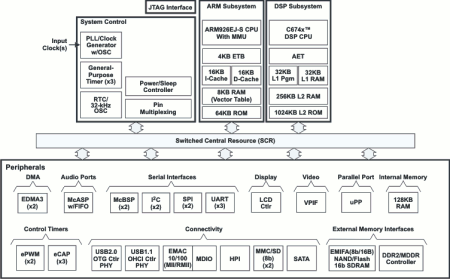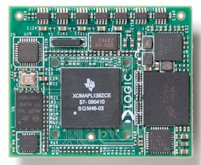TI makes its ARM-plus-DSP processor more secure
Jun 13, 2011 — by Eric Brown — from the LinuxDevices Archive — 55 viewsTexas Instruments (TI) announced that its TMS320C6748 digital signal processor (DSP) and OMAP-L138 DSP/ARM processor now offer security boot and upgrade features. The processors ship with a secure boot capability, as well as a multi-layer encrypted remote upgrade feature that lets users upgrade boot and application code remotely on flash memory while keeping the boot sequence secure, says the company.
The new security features on the C6748 DSP and OMAP-L138 system-on-chip (SoC) are intended to add protection against unauthorized reading of intellectual property (IP) and sensitive data, says TI. Applications include medical patient monitors that use proprietary, certified algorithms, as well as software-defined radios (SDRs), says the company.
The secure boot capability prevents external entities from modifying customer-developed algorithms, says TI. The software is said to block the insertion of malware, or attempts at unauthorized reverse engineering and system cloning.
The new multi-layer encryption functionality enables secure, remote field upgrades, says TI. The feature is said to allow remote boot and application software code upgrades on flash memory while ensuring the boot sequence remains secure.
A device-specific cipher key, known only to the device, is used to protect customer encryption keys, says the company. When an update is needed, the customer creates a new encrypted image using its encryption keys. This enables the device to acquire the image wirelessly and overwrite the existing code, says the company.
TI announced the TMS320C6748 DSP and C6748-equipped OMAP-L138 SoC in June of last year, along with the C6742 and C6746 DSPs. The 300MHz DSPs, which are now clocked to 375MHz in the secure C6748 version, run on a claimed 7mW of standby power at 1.0V/25 degrees C. The DSPs also offer a Dynamic Voltage And Frequency Scaling (DVFS) feature that powers off unused peripherals and provides for selectable I/O voltages, enabling portability and reducing heat dissipation, according to the company.
The C6742 offers basic serial and memory interfaces, while the C6746 adds I/O, including video, Ethernet, and USB 2.0 interfaces. The high-end, newly security enabled C6748 builds on this with a SATA interface, as well as an LCD controller and a USB 1.1 interface.

OMAP-L138 block diagram
(Click to enlarge)
Originally clocked at 300MHz, the ARM core is cranked up to 456MHz in the new secure version, says TI. The OMAP-L138, which is part of the C6 Integra family of processors, is said to support Linux, Windows Embedded CE, and Integrity OS. 
The OMAP-L138 is supported by a Logic PD SOM-M1 computer module (pictured at right). Logic PD also provides design services and turnkey design through manufacturing facilities that support the secure-boot technology implementation, says TI.
Texas Instruments also offers secure-boot functionality on its low-power, C5000 DSP platform and plans to introduce future software-compatible devices with varying levels of security in additional DSP, DSP + ARM, and ARM-only platforms.
Stated Joy Ji, OMAP-L1x DSP + ARM product marketing manager, TI, "This hardware-based security system allows our customers more robust IP protection than typical software-based solutions."
Availability
The secure boot, multi-level encrypted TMS320C6748 DSPs and OMAP-L138 processors are sampling today, with industrial temperature ranges available. Production pricing starts at $18 per 1,000 units (1ku) for the C6748 DSP and $21.40 per 1ku for the OMAP-L138 DSP + ARM processor, says TI. More information may be found at TI's secure C6748 page and secure OMAP-L138 page, respectively.
This article was originally published on LinuxDevices.com and has been donated to the open source community by QuinStreet Inc. Please visit LinuxToday.com for up-to-date news and articles about Linux and open source.